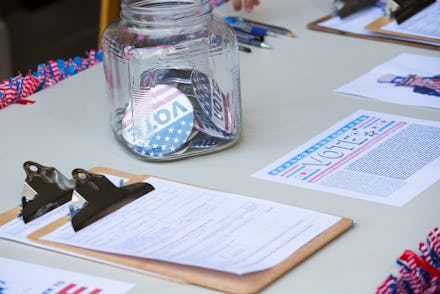How the voting process alienates transgender and gender nonconforming people

I identify as a nonbinary femme. For me, that means that, while the way I present myself is generally read as “feminine,” I don’t think of myself as either male or female. But I experience a lot of cis privilege. I read as “female,” and the gender on my government-issued ID also reads “female,” and that means that I get to participate in all the joys of bureaucratic life in America with little hassle —at least about my gender. But a lot of trans people don’t have this luxury, and it's even more pronounced during election time, when nonbinary and trans people face voting challenges.
Over 965,000 transgender and nonbinary people are eligible to vote in the U.S., but over 378,000 do not have identification that reflects their true name and gender, according to a recent study at UCLA’s William’s School of Law. Eighty-one thousand of those people live in states that have strict laws which require a person to have a “valid” government-issued ID to vote. These kinds of laws aren’t just evidence of gender discrimination, they’re also elitist — it costs a lot of money and time to change your legal name and gender marker.
Many states require a court order, doctor’s note, an amended birth certificate, or even proof of gender affirmation surgery to make these kinds of changes, and since transgender people are more likely to be unemployed and poor than basically everyone else, they often don’t have access to these kinds of services. It’s also worth noting that many transgender people don’t actually want these things, and it is cruel — but unfortunately not unusual — to insist that citizens augment their bodies or stories in these ways to exercise their constitutional right to vote.
Some activists are encouraging trans folks to jump through the legal and medical hurdles anyways. “Right now, we have a lot of trans people who would rather carry an ID that does not match their lived experience than to try to continually fight the system. It gets expensive to change your name, it's such a process to change the gender marker on your documents, but it's very worth it.” Angelica Ross, the actress and founder of TransTech, an organization that teaches LGBTQ people living in poverty essential career skills, told CBS. "We have to do it anyway. It's one way we can reduce harm against us and our communities," Ross said.
Asking people to choose between living in a constant state of misalignment between who they are inside and who they are recognized as, jumping through too-high bureaucratic hoops, or not being able to participate in our democracy is, well, not democratic. Democracy requires the willing participation of every citizen, and these discriminatory voting practices make it near impossible for transgender and nonbinary people to have access to any real choices.
I choose to present as femme in part because I enjoy the performance of femininity, but I also choose it because it makes the logistics of life easier for me. It doesn’t always feel good to me, though, and sometimes I feel I have been coerced into the performance of a binary that I fundamentally do not recognize. That is the emotional price of passing, and no one should be asked to pay it to vote.